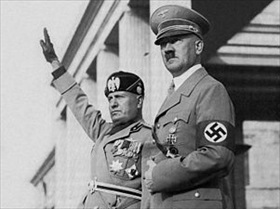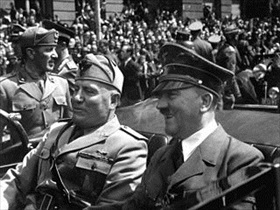MUSSOLINI HINTS AT ATTACK ON GREECE
Brenner Pass, Italy • October 4, 1940
On this date in 1940, at a border crossing between Germany and Italy, Benito Mussolini and Adolf Hitler met for the 7th time. (The duo would meet 17 times.) The Brenner Pass meeting of the 2 Axis Pact dictators followed on the heels of their June 18, 1940, meeting in Munich, which focused on the imminent French surrender to the German Wehrmacht (armed forces) on June 22. In between the 2 meetings, Mussolini had urged Hitler to allow Italy to participate in the planned attack on Great Britain, mostly in order to claim some of the projected spoils, among them semi-independent Egypt, with its Suez Canal, and the jointly administered Anglo-Egyptian Sudan (modern-day Sudan and South Sudan) to add to Italy’s African empire (at the moment Libya, Ethiopia, Eritrea, and Italian Somaliland). Hitler politely but firmly rejected the Duce’s offer of an Italian expeditionary corps, citing the difficulties of supplying 2 invasion armies, but accepted modest Italian air force participation against the Royal Air Force during the Battle of Britain (June–September 1940).
In the Brenner Pass meeting Mussolini laid the groundwork to justify his next conquest, Greece, which Hitler didn’t seem to pick up on. Instead, Hitler was preoccupied with Luftwaffe losses in English skies, which had caused the Fuehrer 2½ weeks earlier to postpone Operation Sea Lion, the amphibious invasion of Great Britain. Also on Hitler’s mind were secret plans to seize Romania’s Ploiești (Ploesti) oil fields in Southeastern Europe in mid-October 1940 and secret plans to liquidate the Soviet Union starting in the spring of 1941 (Operation Barbarossa). Hitler’s surprise move into Romania outraged Mussolini, who believed that that nation fell geographically within his sphere of interests as was generally understood by the 2 dictators in October 1936, just as the Duce’s surprise invasion of Greece from Italian-occupied Albania in late-October 1940 outraged Hitler.
It was almost a truism that whenever the Axis allies acted on their own, things turned out badly for their military partnership. The most egregious example, of course, was Mussolini’s misadventure in Greece, which proved to have negative implications for Barbarossa’s success. It pushed Hitler’s planned 1941 spring invasion of Russia into the summer as German troops rushed to Greece in early April 1941 (Operation Marita) to save the Italian Army from an ignominious defeat by a combined Greek-British expeditionary force. Hitler admitted: “If the Italians hadn’t attacked Greece and needed our help, the war would have taken a different course. We could have anticipated the Russian cold by weeks and conquered Leningrad and Moscow. There would have been no Stalingrad.” Following the Stalingrad debacle, shattered and demoralized men of the Italian, Romanian, Hungarian, Slovak, and Croatian armed forces, Hitler’s allies, retreated behind their national borders, awaiting the Soviet Union’s payback.
Mussolini and Hitler: Tending to the Ties That Bind
 |  |
Left: Mussolini and Hitler review Nazi Party troops parading before 1 of 2 “Honor Temples” (Ehrentempel) on Koenigsplatz, Munich, September 25, 1937. Mussolini’s visit to Munich, Berlin, and Essen, the latter city being the European capital of the steel and armaments industries, cost Germany millions of Reichmarks. Both dictators used the occasion to cement bilateral ties of friendship, which had first been laid down in a friendship pact signed by their foreign ministers in late October 1936. The Germans were rewarded with assurances from the Italians that “special German interests in Austria would not be opposed by Italy,” a green light for the March 1938 Nazi takeover of that country (Anschluss).
![]()
Right: Mussolini visited a clearly triumphant Hitler on June 18, 1940, driving through Munich’s streets in a convertible car and holding discussions with his Axis partner on how to divvy up French spoils as all signs pointed to a Franco-German armistice in the wake of Germany’s invasion of France on May 10. The discussions were held in the Fuehrerbau in the same room where he, Hitler, French Premier Édouard Daladier, and British Prime Minister Neville Chamberlain had divvied up Czechoslovakia in September 1938.
Italy Attacks Greece, 1940–1941
![]()

 History buffs, there is good news! The Daily Chronicles of World War II is now available as an ebook for $4.99 on Amazon.com. Containing a year’s worth of dated entries from this website, the ebook brings the story of this tumultuous era to life in a compelling, authoritative, and succinct manner. Featuring inventive navigation aids, the ebook enables readers to instantly move forward or backward by month and date to different dated entries. Simple and elegant! Click
History buffs, there is good news! The Daily Chronicles of World War II is now available as an ebook for $4.99 on Amazon.com. Containing a year’s worth of dated entries from this website, the ebook brings the story of this tumultuous era to life in a compelling, authoritative, and succinct manner. Featuring inventive navigation aids, the ebook enables readers to instantly move forward or backward by month and date to different dated entries. Simple and elegant! Click 











